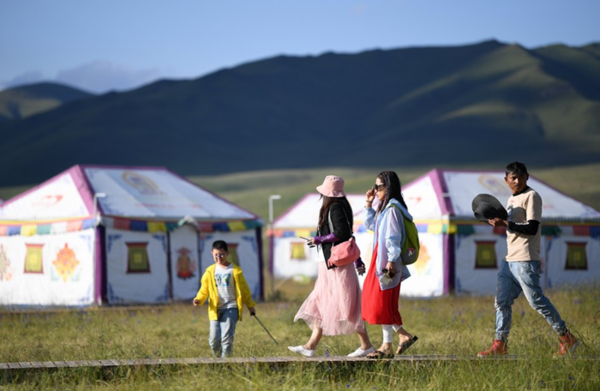Rural Tourism Heralds Prosperity for Remote Tibetan Village
 |
| Tourists hang out in an outdoor area of a camping hotel in Gannan Tibetan Autonomous Prefecture, northwest China's Gansu Province on Aug. 10, 2018. [Xinhua/Chen Bin] |
LANZHOU, Feb. 8 (Xinhua) — Despite the biting cold, Lhunbo Tsering's heart was filled with the warmth of joy as the 52-year-old rode his motorbike to collect his handsome dividend, braving snow-covered roads.
"I will be paid 10,000 yuan (about 1,570 U.S. dollars) today," said Lhunbo Tsering, adding that all 52 households of his native village Ango would earn the same amount in dividends, thanks to the village's transformation into a tourist destination.
Nestled at an average altitude of 3,000 meters, Ango is 61 km from the county seat of Xiahe in Gannan Tibetan Autonomous Prefecture, northwest China's Gansu Province. For generations, villagers in Ango have earned their livelihood through herding, staying obscured from the outside world.
Back in the day, the village, though endowed with natural resources, seldom saw any tourists due to its remote location and weak infrastructure.
Changes began after the local government initiated a series of projects aimed at transforming backward rural and pastoral settlements into modern tourism destinations.
However, the challenges were far from over as the initiatives triggered pushback from the locals. "At that time, the villagers were averse to the demolition of old houses and sheds," Lhunbo Tsering said, adding that as the director of the village committee he had gone door to door to persuade the villagers.
With local government funds, muddy trails were converted into concrete roads, a small village square with recreational facilities was built, and shabby bungalows were renovated into cozy villas with ethnic Tibetan features.
To help the village develop rural tourism more professionally, the local government introduced a tourism development company.
Yang Haijin, chairman of the company, worked to refurbish 143 vacant rooms of the villagers into homestays and encouraged the locals to get involved in tourism businesses.
In 2018, Yang leased a pasture land, spanning an area of 16.7 hectares, from the villagers and set up a glamping hotel. The hotel tents were decorated with Tibetan-style furniture and modern facilities, offering visitors a fusion of tradition and luxury.
As glamping emerged as a new vacation trend, the hotel became a smash hit, gaining popularity online. "During peak seasons, the tents are booked out up to two months in advance," Yang said.
Over the past four years, the company has distributed more than 2.3 million yuan in dividends to 52 village households, attracting more than 50 villagers — many of whom were previously living in poverty — to work in the company.
By utilizing natural and cultural resources, many villages in Gannan have developed rural tourism, bringing additional income to farmers and herders, thus boosting rural vitalization.
Many herders now attach more importance to education, creating a better educational environment for the children there.
"The changes that took place in Ango were not unique. Tourism has opened a window to a broader world for Tibetan people living on the grassland while maintaining a balance between ecology and economy," said Yang Haiqiang, head of Xiahe County.
(Source: Xinhua)
Please understand that womenofchina.cn,a non-profit, information-communication website, cannot reach every writer before using articles and images. For copyright issues, please contact us by emailing: website@womenofchina.cn. The articles published and opinions expressed on this website represent the opinions of writers and are not necessarily shared by womenofchina.cn.






.jpg)

 WeChat
WeChat Weibo
Weibo 京公网安备 11010102004314号
京公网安备 11010102004314号